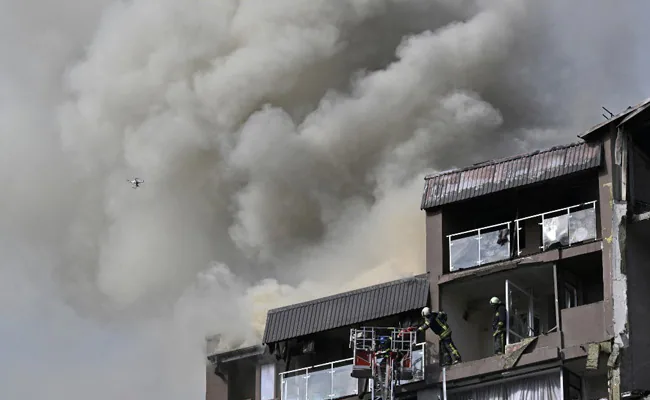[ad_1]

The neighbourhood where the building is located includes a weapons factory.
Kyiv:
Russian strikes hit a residential building in Kyiv on Sunday, the first attack on the capital in almost three weeks, sparking calls by Ukraine for more support from G7 leaders meeting in Germany.
Four people, including a seven-year-old girl, were taken to hospital following the early morning strikes on a neighbourhood that includes a weapons factory, said city mayor Vitali Klitschko.
Moscow meanwhile said its forces had carried out strikes against three military centres in northern and western Ukraine, including one near the border with Poland.
The high-profile attacks, just over four months since Russia invaded its neighbour, come ahead of a week of Western diplomacy focused around the G7 and NATO summits.
Ukrainian President Volodymyr Zelensky will address both gatherings, where allies including US President Joe Biden will take stock of their support for Kyiv and of sanctions imposed on Moscow.
Biden on Sunday condemned the attack on Kyiv as “more of their barbarism”, referring to Russia.
The G7 talks opened Sunday with the announcement of a ban on imports of Russian gold, but Ukrainian Foreign Minister Dmytro Kuleba called for more.
He posted on Twitter a photo of an injured child being carried on a stretcher, who he said was “sleeping peacefully in Kyiv until a Russian cruise missile blasted her home”.
The “G7 summit must respond with more sanctions on Russia and more heavy arms for Ukraine. Russia’s sick imperialism must be defeated”, he said.
The European Union this past week offered a strong show of support when it granted Ukraine candidate status, although the path to membership is long.
‘Intimidate Ukrainians’
Russian forces sought to encircle Kyiv in the first few weeks after the February 24 invasion, but Sunday’s attack was the first strike on the capital since early June.
Klitschko said the attack was a Russian missile strike intended to “intimidate Ukrainians” ahead of the NATO summit.
It was the third time since the invasion that this northwest neighbourhood had been hit. A weapons factory nearby produces air-to-air and anti-tank rockets among others.
An AFP team said there was a fire on the top three floors of the building and its stairwell was completely destroyed.
Afterwards, residents gathered at the bottom of the building, many of them in tears. One woman was still wearing a bathrobe.
“I woke up at the first explosion, went to the balcony and saw missiles falling and heard a huge explosion — everything vibrated,” 38-year-old Yuri told AFP, declining to give his surname.
Edward Shkuta, who lives next door, said there had been four missiles since 6:30am.
A building “was directly hit on the top floors and I saw wounded people coming out”.
‘Fully occupied’
In recent months, the fighting in Ukraine has focused on the eastern Donbas region, which has been partially under the control of pro-Moscow separatists since 2014.
The Russians made a strategic breakthrough Saturday when they took the industrial hub of Severodonetsk, the scene of weeks of fierce battles that have left it largely destroyed.
Severodonetsk’s mayor said it had been “fully occupied” by Russian troops after Ukrainian forces retreated to better defend the neighbouring city of Lysychansk.
Pro-Moscow separatists on Saturday said Russian troops and their allies had entered Lysychansk, which faces Severodonetsk on high ground across the Donets river.
Its capture would give Russia control of the entire Lugansk region in the Donbas, Ukraine’s industrial heartland.
At talks on the sidelines of the G7, British Prime Minister Boris Johnson and French President Emmanuel Macron said they saw an “opportunity to turn the tide” in Ukraine, a Downing Street spokesman said.
But Johnson also cautioned Macron — who has maintained a dialogue with Putin, unlike the British leader — that “any attempt to settle the conflict now will only cause enduring instability”.
Pull in Belarus
In Saint Petersburg on Saturday, Putin said Russia would deliver Iskander-M missiles capable of carrying nuclear warheads to Belarus in the coming months, as he received Belarusian leader Alexander Lukashenko.
He also offered to upgrade Belarus’ warplanes to make them capable of carrying nuclear weapons, in comments broadcast on Russian television.
Putin has referred to nuclear weapons several times since the invasion, in what the West has seen as a warning to the West not to intervene.
Ukraine said it had come under “massive bombardment” Saturday morning from neighbouring Belarus which, although a Russian ally, is not officially involved in the conflict.
As in the southern port of Mariupol before it, the battle for Severodonetsk has devastated the city.
On Saturday, Severodonetsk Mayor Oleksandr Striuk said civilians had begun to evacuate the Azot chemical plant, where several hundred people had been hiding from shelling.
“These people have spent almost three months of their lives in basements, shelters,” he said. “That’s tough emotionally and physically.”
They would now need medical and psychological support, he added.
In Russian-occupied Mariupol, meanwhile, residents face the prospect of a desperately cold winter, according to mayoral adviser Petro Andryushenko, who said local committees were being instructed to collect data on the need for firewood and coal.
“This is a direct signal and an acknowledgement of the obvious fact — there will be no heating in winter,” he said.
The city’s Moscow-backed leadership could not even provide heat if they wanted to, given the “huge damage” to the pipeline that supplied the city with natural gas, Andryushenko added.
(Except for the headline, this story has not been edited by NDTV staff and is published from a syndicated feed.)
[ad_2]
